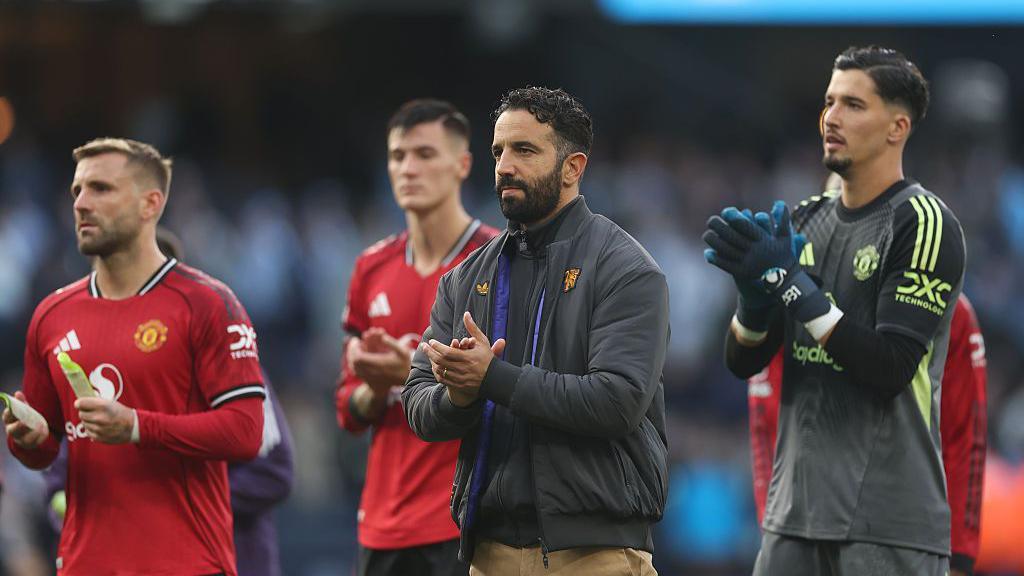Wayne Rooney has heavily criticized Ruben Amorim’s management of Manchester United, claiming the team has declined since Amorim’s arrival. He pointed to poor results, tactical inflexibility, and disillusioned fans as evidence of the team’s struggles under the Portuguese coach.
Former Manchester United captain Wayne Rooney has delivered a scathing assessment of the club's progress under manager Ruben Amorim, stating that the team has "got worse" since the Portuguese coach took charge. Amorim was appointed on November 1st of last year, succeeding Erik ten Hag, who had been sacked in the hopes of revitalizing the struggling side.
However, nearly a year into Amorim's tenure, the Red Devils continue to flounder, failing to exhibit any tangible signs of improvement. This sentiment was further amplified by a dismal 3-0 defeat at the hands of local rivals Manchester City on Sunday, a match that saw disillusioned fans departing Old Trafford long before the final whistle.
Speaking on the latest episode of The Wayne Rooney Show, Rooney expressed his frustration: "I want to be as supportive and positive as I can be on the manager and the players, but it is very difficult to sit here and say we are seeing progression, and at least we're seeing things that will get results in the near future. We're seeing none of that, and it is very difficult."
Rooney highlighted the powerful image of Manchester United fans leaving the game early, stating, "You could hear the fans singing Amorim's name, but I think that is so powerful that the United fans were leaving the game. You know the game is over and I think they were very disappointed in what they were seeing. It is hard to see how it continues. What are the patterns? What are we seeing what might improve the team moving forward?"
Last season saw United finish a lowly 15th in the league with a meager 42 points, marking their worst performance since 1989–90. Their points total was also the lowest since their relegation in 1973–74. Despite significant investment under Amorim, with approximately £250 million spent on new signings and the departure of numerous players deemed surplus to requirements, the team's fortunes have not improved.
Amorim's decision to implement a rigid 3-4-3 formation, a system that brought him success at Sporting, has come under scrutiny. However, many of last season's problems already appear to be resurfacing.
"I think after the last year when Ten Hag got sacked and Ruben came in, we're hearing how they're going to play and it is going to change," Rooney said, "I think if the manager is honest with himself, it has got worse."
United's struggles are not limited to the league. They suffered an early and humiliating defeat in the Carabao Cup at the hands of League Two side Grimsby. Their attacking woes are also evident, with only two goals scored from open play in the opening weeks of the 2025-26 campaign. Furthermore, their four points from the opening four league fixtures represent their worst return at this stage since 1992-93 under Sir Alex Ferguson.
While Ferguson had the benefit of previous successes to fall back on, including FA Cup, League Cup, and European Cup Winners' Cup victories, Amorim's record stands in stark contrast. His win rate of 36% across all competitions is the worst of any permanent United manager since World War Two, with a dismal 26% win rate in the league.
Since Amorim's arrival, United's form has been comparable to that of a team facing relegation. Of the 17 sides who have been in the Premier League throughout Amorim's tenure, United have the worst record alongside Tottenham, accumulating just 31 points from 31 games.
"Quite a lot of league seasons that is relegation form," Rooney said. "What is important when you're trying to implement a new style is you win games as well while you're doing that."
Rooney also echoed concerns regarding Amorim's tactical approach, specifically his insistence on deploying two central midfielders against opposition sides often featuring three. "The problem with this [3-4-3] system is having two in [central] midfield," he said. "The players have not got the energy and legs to cover the full width of the pitch and go up and down. They're getting overrun and overpowered in that midfield."
He added, "Listen, I have had my time as a manager, and I know how it works, and I know how it is when someone else looks and critiques your formation. I can understand that, but it is so obvious. If you're struggling, you have to put three in midfield and give yourself a chance to compete."
